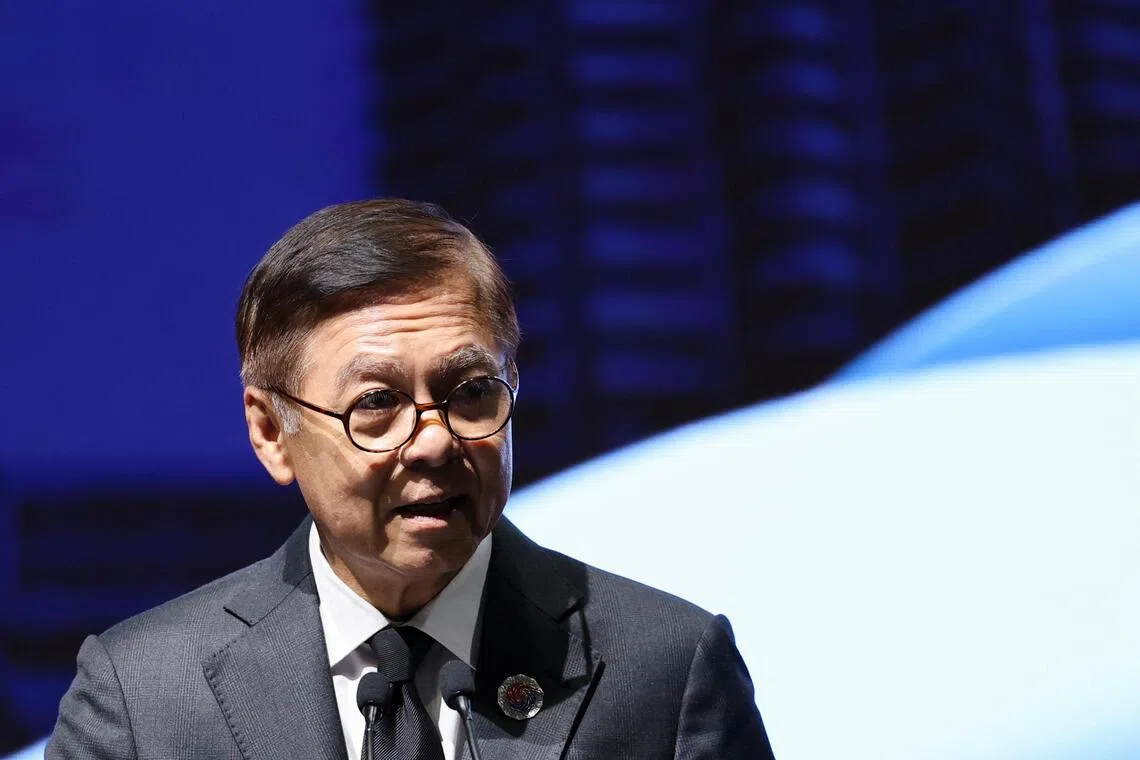Thailand seeks to leverage peace deal for Trump tariff relief
Sign up now: Get ST's newsletters delivered to your inbox

Thailand's Foreign Minister Sihasak Phuangketkeow noted potential avenues include climate change, health and transnational crime.
PHOTO: REUTERS
Follow topic:
BANGKOK – Thailand’s top diplomat said the country aims to leverage its peace efforts with neighbouring Cambodia – a favourite theme for US President Donald Trump – to seal a US tariff deal and revamp their decades-old alliance.
Speaking a day after his country signed an accord with Cambodia
“Since we started the talks with Cambodia facilitated by the US, we’ve always said that we hope that the United States would also look into the issue of the tariffs,” Mr Sihasak said.
“We’ve conveyed our position that we hope that US would give positive consideration to some of our concerns, and also look at these tariff talks in the broader context of the broader interests that we share.”
While border tensions and trade talks are separate issues as far as Thailand is concerned, the accord signed during a regional summit offered Prime Minister Anutin Charnvirakul an opportunity to raise tariff issues with Mr Trump directly.
The South-east Asian neighbours ended a brief but deadly border clash
Mr Trump’s visit to Asia has seen a president eager to advance ties with its Asian allies and partners ahead of a meeting on Oct 30 with his Chinese counterpart Xi Jinping in South Korea.
Earlier this week, at the Association of South-east Asian Nations (Asean) summit, he signed trade agreements with host country Malaysia and Cambodia, as well as critical-minerals pacts with Malaysia and Thailand.
The US president then flew on to Tokyo, where he heaped praise
Mr Anutin signed a framework trade agreement with Mr Trump alongside Cambodia and Thailand at the peace declaration event.
Key details, including any relief from Mr Trump’s 19 per cent tariff, are still to be negotiated.
Mr Sihasak sees that as an opportunity to reset Thailand’s relationship with the US.
The challenge for Bangkok, he said, is finding new areas of common interest with the US while balancing ties with China, Thailand’s largest trading partner.
The diplomat, who has more than four decades of experience and assumed office in September, noted potential avenues include climate change, health and transnational crime, an issue of growing concern for Washington because of the regional scam operations.
He added that a memorandum of understanding on critical minerals, signed with the US during Mr Trump’s visit, has the potential to help Thailand develop the sector.
“The economic dimension is important and there’s much more that we can do,” Mr Sihasak said. “Thailand should be a vital partner of the United States.”
Thailand is one of only two US treaty allies in South-east Asia, with the 1954 Manila Pact the bedrock of their security relationship and the 1966 Treaty of Amity offering favourable investment terms for American businesses, helping establish a manufacturing sector that helped drive economic growth.
During the Vietnam War, Thailand provided the US with critical military access and today remains a staging ground for some of the region’s largest joint exercises.
“We have to bring this treaty alliance into the current situation that confronts us now because the treaty alliance originated during the Cold War,” Mr Sihasak said. “The Cold War is over.”
The relationship has often been tested by cycles of coups and street protests, as military-backed governments moved to suppress pro-democracy movements, creating cycles of unrest that have weighed on the economy.
The first step, Mr Sihasak said, will be amending the Constitution enacted under the military-backed government. Thailand is also slated to hold national elections in the coming months.
“From where we were – let’s say 20, 30 years ago – now we’re not so prominent on the radar screen of the US and that’s partly because of our politics have been unstable,” the diplomat said.
“It’s important also that Thailand tries to sort out our politics and get our politics back on track – and this is what the government is trying to do.” BLOOMBERG

